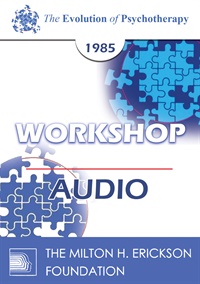
- Average Rating:
- Not yet rated
- Topic Areas:
- Workshops | Transactional Analysis | Borderline | Depression | Phobia | Psychotherapy
- Categories:
- Evolution of Psychotherapy | Evolution of Psychotherapy 1985
- Faculty:
- Mary Goulding, MSW
- Duration:
- 2 Hours 38 Minutes
- Format:
- Audio Only
- Original Program Date:
- Dec 14, 1985
- Short Description:
- This workshop will address specific problems: phobias, depression, uses of T.A. with borderline clients, and addictions. Presentation and discussion.
- Price:
- $15.00 - Base Price
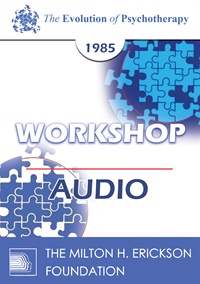
- Average Rating:
- Not yet rated
- Topic Areas:
- Workshops | Cognitive Behavior Therapy (CBT) | Depression | Psychotherapy
- Categories:
- Evolution of Psychotherapy | Evolution of Psychotherapy 1985
- Faculty:
- Aaron Beck, MD | Stowe Hausner, PhD
- Duration:
- 2 Hours 45 Minutes
- Format:
- Audio Only
- Original Program Date:
- Dec 14, 1985
- Short Description:
- An information processing model designed to clarify the biased and constricted thinking in depression will be described. The practical applications of the model use principles of guided discovery and collaborative empiricism. There will be a demonstration of specific strategies applied to dysfunctional cognitions and beliefs. A blending of cognitive and behavioral techniques are used for in vivo exercises.
- Price:
- $15.00 - Base Price
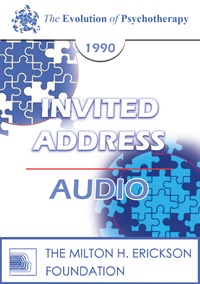
- Average Rating:
- Not yet rated
- Topic Areas:
- Invited Addresses | Depression | Psychotherapy | Therapist Development
- Categories:
- Evolution of Psychotherapy | Evolution of Psychotherapy 1990
- Faculty:
- Joseph Wolpe, M.D. | Thomas Szasz, MD
- Duration:
- 1:24:43
- Format:
- Audio Only
- Original Program Date:
- Dec 14, 1990
- Short Description:
- Accepted thinking about non-polar, non-psychotic depression has been impaired by ignoring crucial research. This shows that some cases are masked endogenous depression; others are anxiety-based in several ways. Therefore, each case must be investigated to decide appropriate treatment and thus surpass the mediocre results typified in the "Collaborative Study."
- Price:
- $15.00 - Base Price
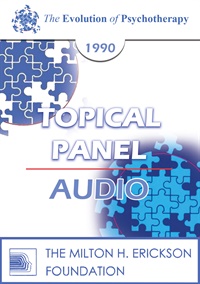
- Average Rating:
- Not yet rated
- Topic Areas:
- Topical Panels | Anxiety | Depression | Psychotherapy
- Categories:
- Evolution of Psychotherapy | Evolution of Psychotherapy 1990
- Faculty:
- Alexander Lowen, MD | Donald Meichenbaum, PhD | Paul Watzlawick, PhD | Joseph Wolpe, M.D.
- Duration:
- 1:00:11
- Format:
- Audio Only
- Original Program Date:
- Dec 12, 1990
- Short Description:
- Topical Panel 02 from the Evolution of Psychotherapy 1990 - Treatment of Despression and Anxiety Featuring Alexander Lowen, MD; Donald Meichenbaum, PhD; Paul Watzlawick, PhD; and Joseph Wolpe, MD. Moderated by Michael Yapko, PhD.
- Price:
- $15.00 - Base Price
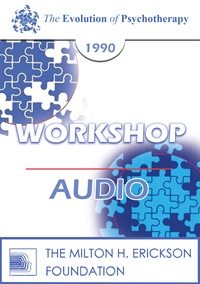
- Average Rating:
- Not yet rated
- Topic Areas:
- Workshops | Cognitive Behavior Therapy (CBT) | Depression | Psychotherapy
- Categories:
- Evolution of Psychotherapy | Evolution of Psychotherapy 1990
- Faculty:
- Aaron Beck, MD | Christine Padesky, PhD
- Duration:
- 2 Hours 41 Minutes
- Format:
- Audio Only
- Original Program Date:
- Dec 13, 1990
- Short Description:
- Strategies developed in cognitive therapy of depression are readily applied to couples' problems: Assessment includes ascertaining conflicting perspectives, thinking disorder, escalation of distortions, and cognitive interference with communication. Interventions include reducing hostility, reinforcing pleasure, increasing collaboration) and improving sexual satisfaction through cognitive interventions. Prerequisite reading: Love is Never Enough (Harper & Row).
- Price:
- $15.00 - Base Price
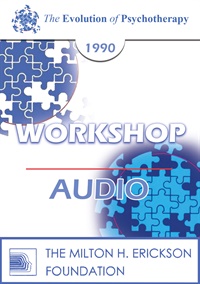
- Average Rating:
- Not yet rated
- Topic Areas:
- Workshops | Anger | Anxiety | Cognitive Behavior Therapy (CBT) | Depression | Psychotherapy
- Categories:
- Evolution of Psychotherapy | Evolution of Psychotherapy 1990
- Faculty:
- Donald Meichenbaum, PhD
- Duration:
- 2 Hours 2 Minutes
- Format:
- Audio Only
- Original Program Date:
- Dec 15, 1990
- Short Description:
- The focus will be on the cognitive-behavioral treatment of affective disorders (anxiety, depression, and anger). Such procedures as cognitive restructuring, problem-solving, and stress inoculation training will be examined.
- Price:
- $15.00 - Base Price
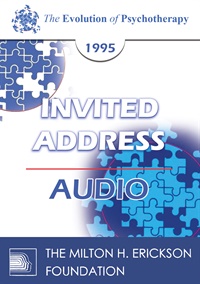
- Average Rating:
- Not yet rated
- Topic Areas:
- Invited Addresses | Cognitive Behavior Therapy (CBT) | Psychotherapy | Anxiety | Depression | Panic
- Categories:
- Evolution of Psychotherapy | Evolution of Psychotherapy 1995
- Faculty:
- Aaron Beck, MD | Salvador Minuchin, MD
- Duration:
- 1 Hour 31 Minutes
- Format:
- Audio Only
- Original Program Date:
- Dec 14, 1995
- Short Description:
- Cognitive therapy was originally developed for the treatment of Depression and Anxiety. Since its early beginnings various clinicians and investigators have extended its use to a wide variety of disorders and populations. Systematic outcome studies have demonstrated its efficacy not only in the garden variety of disorders such as Depression, Anxiety and Panic but also in medical disorders such a low back pain, diabetes, chronic fatigue syndrome and chronic hypertension.
- Price:
- $15.00 - Base Price
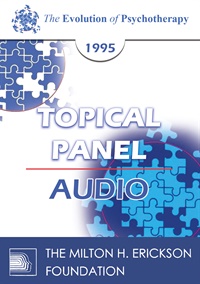
- Average Rating:
- Not yet rated
- Topic Areas:
- Topical Panels | Anxiety | Depression | Psychotherapy
- Categories:
- Evolution of Psychotherapy | Evolution of Psychotherapy 1995
- Faculty:
- Alexander Lowen, MD | Judd Marmor | Peggy Papp, ACSW | Paul Watzlawick, PhD
- Duration:
- 1:00:36
- Format:
- Audio Only
- Original Program Date:
- Dec 15, 1995
- Short Description:
- Panel 03 from the Evolution of Psychotherapy 1995 - Treatment of Depression and Anxiety Featuring Alexander Lowen, M.D.; Judd Marmor, M.D.; Peggy Papp, A.C.S.W.; and Paul Watzlawick, Ph.D. Moderated by Janette Edgette, PsyD.
- Price:
- $15.00 - Base Price
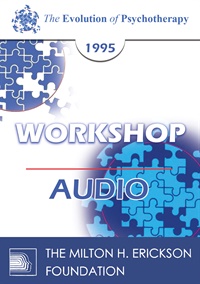
- Average Rating:
- Not yet rated
- Topic Areas:
- Workshops | Art and Creativity | Social Issues | Depression | Religion | Psychotherapy
- Categories:
- Evolution of Psychotherapy | Evolution of Psychotherapy 1995
- Faculty:
- James Hillman, PhD
- Duration:
- 2 Hours
- Format:
- Audio Only
- Original Program Date:
- Dec 14, 1995
- Short Description:
- This workshop is a phenomenology of melancholy. Jungian approaches to depression; clinical treatments, societal implications, resistances, suicidal risks and practical techniques will be demonstrated. The 50-minute, prizewinning BBC Documentary "Kind of Blue," narrated by the presenter will be featured.
- Price:
- $15.00 - Base Price
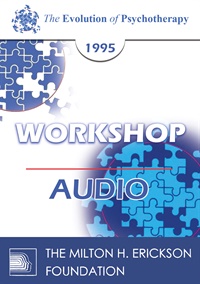
- Average Rating:
- Not yet rated
- Topic Areas:
- Workshops | Cognitive Behavior Therapy (CBT) | Depression | Personality Disorders | Psychotherapy
- Categories:
- Evolution of Psychotherapy | Evolution of Psychotherapy 1995
- Faculty:
- Aaron Beck, MD
- Duration:
- 1 Hour 22 Minutes
- Format:
- Audio Only
- Original Program Date:
- Dec 16, 1995
- Short Description:
- The focus of this workshop is on problems in therapy: overdependency, ''negative transference,'' acting out, therapeutic impasse and resistance. The same dysfunctional beliefs that maintain psychological disorders interfere with therapeutic change. Specific strategies pinpoint these beliefs as well as the cognitive distortions. This workshop will describe treatment variations for the difficult disorders such as borderline personality, chronic depression and severe agoraphobia.
- Price:
- $15.00 - Base Price
Please wait ...

